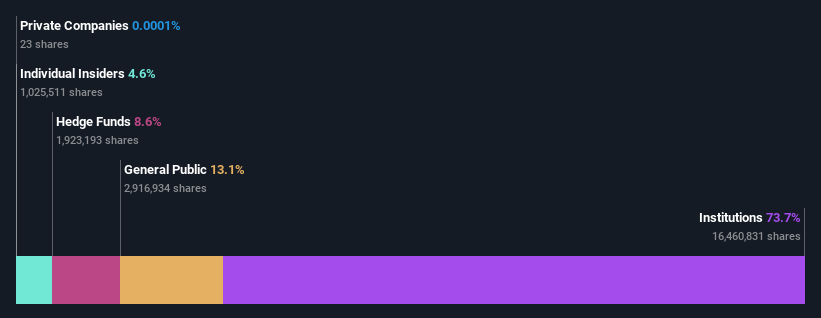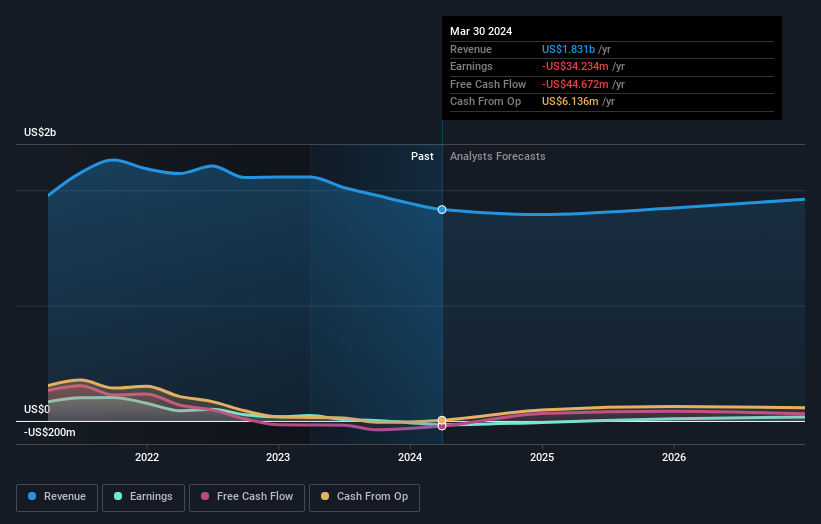Stock Analysis
- United States
- /
- Specialty Stores
- /
- NasdaqGS:SNBR
Institutional owners may consider drastic measures as Sleep Number Corporation's (NASDAQ:SNBR) recent US$60m drop adds to long-term losses

Key Insights
- Significantly high institutional ownership implies Sleep Number's stock price is sensitive to their trading actions
- 51% of the business is held by the top 12 shareholders
- Ownership research along with analyst forecasts data help provide a good understanding of opportunities in a stock
If you want to know who really controls Sleep Number Corporation (NASDAQ:SNBR), then you'll have to look at the makeup of its share registry. And the group that holds the biggest piece of the pie are institutions with 74% ownership. In other words, the group stands to gain the most (or lose the most) from their investment into the company.
And so it follows that institutional investors was the group most impacted after the company's market cap fell to US$342m last week after a 17% drop in the share price. Needless to say, the recent loss which further adds to the one-year loss to shareholders of 27% might not go down well especially with this category of shareholders. Institutions or "liquidity providers" control large sums of money and therefore, these types of investors usually have a lot of influence over stock price movements. Hence, if weakness in Sleep Number's share price continues, institutional investors may feel compelled to sell the stock, which might not be ideal for individual investors.
Let's delve deeper into each type of owner of Sleep Number, beginning with the chart below.
View our latest analysis for Sleep Number

What Does The Institutional Ownership Tell Us About Sleep Number?
Many institutions measure their performance against an index that approximates the local market. So they usually pay more attention to companies that are included in major indices.
As you can see, institutional investors have a fair amount of stake in Sleep Number. This can indicate that the company has a certain degree of credibility in the investment community. However, it is best to be wary of relying on the supposed validation that comes with institutional investors. They too, get it wrong sometimes. It is not uncommon to see a big share price drop if two large institutional investors try to sell out of a stock at the same time. So it is worth checking the past earnings trajectory of Sleep Number, (below). Of course, keep in mind that there are other factors to consider, too.

Institutional investors own over 50% of the company, so together than can probably strongly influence board decisions. Our data indicates that hedge funds own 8.6% of Sleep Number. That worth noting, since hedge funds are often quite active investors, who may try to influence management. Many want to see value creation (and a higher share price) in the short term or medium term. Our data shows that Stadium Capital Management, LLC is the largest shareholder with 8.6% of shares outstanding. Meanwhile, the second and third largest shareholders, hold 7.0% and 5.6%, of the shares outstanding, respectively. Furthermore, CEO Shelly Ibach is the owner of 1.3% of the company's shares.
After doing some more digging, we found that the top 12 have the combined ownership of 51% in the company, suggesting that no single shareholder has significant control over the company.
Researching institutional ownership is a good way to gauge and filter a stock's expected performance. The same can be achieved by studying analyst sentiments. There are plenty of analysts covering the stock, so it might be worth seeing what they are forecasting, too.
Insider Ownership Of Sleep Number
The definition of company insiders can be subjective and does vary between jurisdictions. Our data reflects individual insiders, capturing board members at the very least. Company management run the business, but the CEO will answer to the board, even if he or she is a member of it.
Most consider insider ownership a positive because it can indicate the board is well aligned with other shareholders. However, on some occasions too much power is concentrated within this group.
We can see that insiders own shares in Sleep Number Corporation. As individuals, the insiders collectively own US$16m worth of the US$342m company. This shows at least some alignment. You can click here to see if those insiders have been buying or selling.
General Public Ownership
The general public-- including retail investors -- own 13% stake in the company, and hence can't easily be ignored. While this size of ownership may not be enough to sway a policy decision in their favour, they can still make a collective impact on company policies.
Next Steps:
It's always worth thinking about the different groups who own shares in a company. But to understand Sleep Number better, we need to consider many other factors. Take risks for example - Sleep Number has 3 warning signs (and 2 which are a bit concerning) we think you should know about.
If you would prefer discover what analysts are predicting in terms of future growth, do not miss this free report on analyst forecasts.
NB: Figures in this article are calculated using data from the last twelve months, which refer to the 12-month period ending on the last date of the month the financial statement is dated. This may not be consistent with full year annual report figures.
Valuation is complex, but we're helping make it simple.
Find out whether Sleep Number is potentially over or undervalued by checking out our comprehensive analysis, which includes fair value estimates, risks and warnings, dividends, insider transactions and financial health.
View the Free AnalysisHave feedback on this article? Concerned about the content? Get in touch with us directly. Alternatively, email editorial-team (at) simplywallst.com.
This article by Simply Wall St is general in nature. We provide commentary based on historical data and analyst forecasts only using an unbiased methodology and our articles are not intended to be financial advice. It does not constitute a recommendation to buy or sell any stock, and does not take account of your objectives, or your financial situation. We aim to bring you long-term focused analysis driven by fundamental data. Note that our analysis may not factor in the latest price-sensitive company announcements or qualitative material. Simply Wall St has no position in any stocks mentioned.
About NasdaqGS:SNBR
Very undervalued with moderate growth potential.

